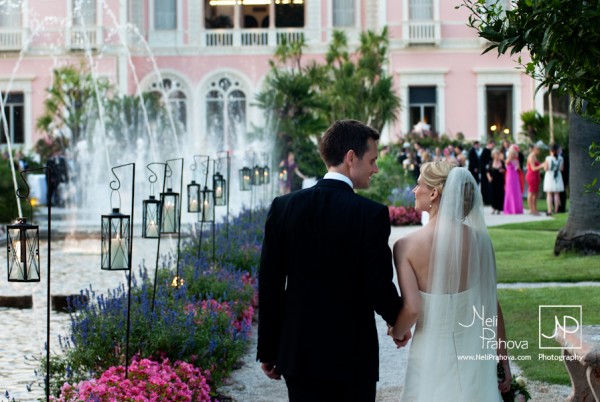
by Michael | Dec 4, 2015 | Blog
Of course, you want things to go well for your wedding. In fact, you want a wonderful wedding! But it doesn’t just depend on you. Does everybody understand their role?
Weddings can be a time of stress, so it’s important for people to make allowances.
As a civil celebrant myself, I have to point out that the celebrant should be able to play a role in smoothing the way much of the time, but not everything will be within their control!
Here is some advice for those playing an active role in the proceedings:
Bride
- Ensure you don’t get rolling drunk! Apart from anything else, there will be plenty of embarrassing photographic evidence to haunt you later in life. It may also not make the best possible impression on your new relatives!
- Try and make sure you speak to all your wedding guests (they have come to see and support you).
Bridegroom
- Much of the stress in the run-up to the wedding day is borne by the bride. Do what you can, especially on the day, to share the load.
- Don’t hide away with your mates; meet and make conversation with your new wife’s friends and even relatives.
- Don’t get rolling drunk! You have a speech to deliver effectively and the comments I aimed at the bride apply to you just as much.
The bride’s mother
It is good to remember whose big day it actually is – it’s really your daughter’s. So be there early, be willing to help, but don’t criticise either other people or arrangements. This just compounds any stress being experienced.
Be prepared to play second fiddle.
The Groom’s mother
As with the bride’s mother, be supportive rather than domineering or critical. Be helpful and open and say nice things to the bride! Don’t try and get revenge for a perceived slight during the wedding planning.
The Father(s)
Just like the bride and groom, you need to be sober and in control, not least when toasting the couple’s marriage.
Don’t use the opportunity to get even with somebody who you feel has affronted you during the wedding build-up.
If you want advice on the best man, maid of honour, ushers, bridesmaids and children, please be patient, as my very next blog will address this.
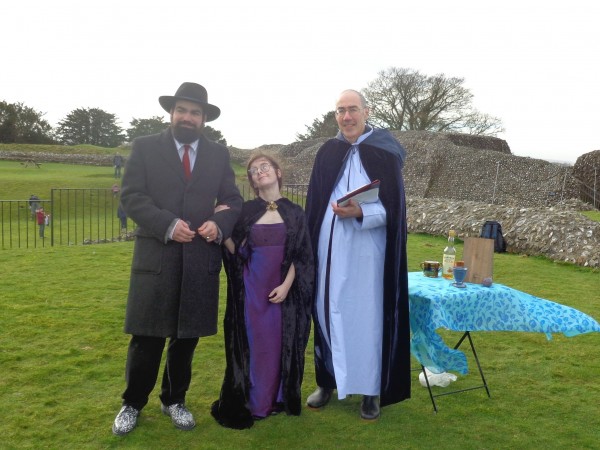
by Michael | Oct 22, 2015 | Blog
One of my favourite ceremonies, of all I have conducted, must be the handfasting wedding at Old Sarum iron age fort, overlooking Salisbury.
The weather turned out to be mild and dry –remarkable, considering that there had been serious flooding either side of the ceremony. The sun even came out on the lucky couple.
It was my first handfasting, and, to be honest, something I had never heard of until relatively recently. It turned out to be a moving and memorable occasion for all concerned, all the more interesting as a Pagan was marrying a half-Jew (with elements from both religions being included).
In my experience, few people have even heard of handfastings, so a word or two of explanation might not go amiss here.
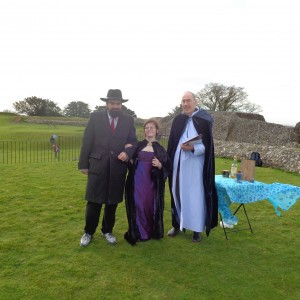
Just what is a handfasting?
A handfasting is a Celtic ceremony, which is a betrothal or wedding ritual in which the couple’s clasped hands are draped with a cord or ribbon while they hold hands. Their hands (or wrists, actually) are literally tied together. In the traditional version, hands are knotted together from 10 a.m. till midnight, which is certainly interesting, if only logistically!
Each partner holds the hands of the other (right hand to right; left to left) with their wrists crossed. The ribbon is wound around the wrists over the top of one and under and around the other, thus creating the infinity symbol.
Hence, “tying the knot” and “bonds of matrimony”!
What is its origin?
This ancient, Celtic, nature-related, spiritual tradition dates back to way before weddings took the form (legally and ritually) that they do today. It is a ceremony of commitment that was first recorded 4,000 years ago.
Who would choose this?
People who do not want a formal, conventional religious ceremony might well enjoy and appreciate this beautiful and meaningful ceremony. Some choose it, as did Anne and Ross, for their wedding; others, after saying their vows; and still others at a betrothal for one year and a day (like a trial period, at the end of which participants can decide whether or not to renew).

Where can this take place?
Subject to permission, this ceremony can be held more or less anywhere, indoors or out. I can perform handfastings in the inner circle at Stonehenge, but there are no shortages of alternative atmospheric venues, such as Old Sarum.
It is a refreshing and lovely ritual and deserves to be better known about.
by Michael | Sep 1, 2015 | Blog
It is difficult to imagine a wedding without the mother of the bride somewhere in the forefront!
Source: telegraph.co.uk
Of course, it is right and proper that the bride and, indeed, the groom should have the limelight. Yet it would be wrong to underestimate the contribution that the bride’s mother will have made in the run-up (and even on the day itself).
Tasks
One of the bride’s mother’s first tasks will happen soon after the news of the engagement: making contact with the groom’s parents – face-to-face, if possible, or, at least, over the phone. It’s important to start on a good footing, as there’ll probably be need for co-operation and agreement later on, when making the arrangements.
Another early job may be putting together the engagement party, if there is one, but that is simply a warm-up exercise!
Whether or not the bride’s parents are stumping up all or part of the cash for the wedding, the mother of the bride will probably be fully involved helping her daughter with the planning. That normally entails choosing the venue, deciding on the guest list and dress-shopping, although it can include things like choosing the menu, etc.
The big challenge
One of the most demanding balancing acts is moderating the level of control the bride’s mother will wish to exercise. It is sometimes difficult to square what she sees as practicalities and necessities with the fact that it is actually the couple’s big day and their wishes absolutely need to be respected. Tact, understanding and persistence (on both sides) are qualities that may come into their own. It would be tragic if the mother-daughter relationship were to collapse due to ego or petty intolerance.
Venue
Budget will play a role, but the couple must feel sure that the venue will meet their needs – and that goes for atmosphere, catering, accommodation – and that the home team can be relied upon to look after them properly.
Celebrant
An area where the mother of the bride may offer valuable advice is the ceremony itself. However, it really should be down to the couple to make the final decisions here. They should be able to choose the degree of religiosity, rituals, music, readings, participants etc. There may need to be some compromising!
Dress
When the bride chooses her dress, her mother will surely have useful input to offer, but the bride should not be bludgeoned into wearing something she will not feel happy or comfortable in.
Guest list
It’s always difficult to agree how many and whom to invite. The couple may well appreciate guidance here. Especially if the parents are bankrolling the event, they should expect a measure of choice as to who is invited, but the couple’s wishes are paramount. It may help to draw up a list of “essential” guests (the closest relatives and friends) and then, if money and space permit, moving on to the “desired” guests. Only after that, consider inviting less close contacts.
The Wedding itself
The wedding day is not the time for the bride’s mother to start complaining! What’s done is done, and pointing out “I told you so!” is only likely to antagonise people and potentially ruin proceedings. Support and love are what matter now.
The mother of the bride will traditionally be part of the processional and will head up any receiving line at the reception. Her contribution will normally be acknowledged in the speeches.
The bride’s mother has some real multi-tasking to do: over the months, she must be confidante, adviser, sounding-board and supporter for her daughter. The bride will be embarking on a new journey – although she need not become independent of her parents even now – but what a contribution her mother can make, as she sends her daughter out from the nest feeling confident, happy and full of love!
by Michael | Jun 30, 2015 | Blog
A Muslim marrying a Jewess – that doesn’t happen every day!
Tempting as it is to devote this blog to a discussion of inter-racial or inter-religious harmony, that’s not really my subject, wonderful as it might be.
Mixed marriages are more up my professional street, though.
Be that as it may, I was delighted to contribute (in a tiny way) to this utopian ideal by conducting a wedding blessing very recently at a mixed marriage. It was, indeed, the union of Muslim and Jewess.
Neither one of the couple was religious, in fact. The Muslim wanted no part in any religious ceremony (although he did agree to participate in our blessing, as long as he didn’t have to say anything); the Jewess agreed to it mostly to satisfy her parents.
I had worked with M.’s mother (although M. was given the opportunity to ask for amendments etc.) to create a suitable blessing ceremony. Essentially, it would consist of a number of blessings in English (a few in Hebrew), the traditional “Seven Blessings” in both languages, and some wine. Thus, a mix of traditional and modern.
On the day, I sought out the groom, who, not unreasonably, was a bit nervous about the whole event, and put him at ease. We had a chat, and I told him what was going to happen, and that he didn’t need to worry about anything.
After the legal marriage (which took place in the same hall), I took over. I threw in a couple of impromptu little jokes at the start, so the couple could feel more comfortable, and made a few guests smile with my introductory remarks.
I then went through the blessings, as agreed, but what was nice was how the groom visibly relaxed – even to the extent of cracking a joke himself when it came to the wine!
The blessing ceremony only lasted 10 minutes, at most, but it was obviously appreciated and I felt very pleased, though humble too, because of the role I had been able to play in the union of two lovely people of potentially clashing cultures.
May they be a beacon for others – and may they find true happiness!
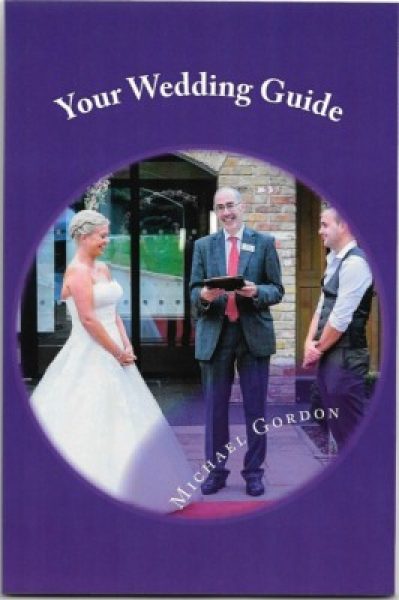
by Michael | Apr 29, 2015 | Blog
An insuperable obstacle?
Planning a wedding is a pretty daunting prospect. You may just be lucky, and have wise advisors and experienced, understanding support. The chances are, though, that it’s new to you, and you’re going to have to do the best you can. You’ll have to make – and learn from – your own mistakes. Some may be expensive.
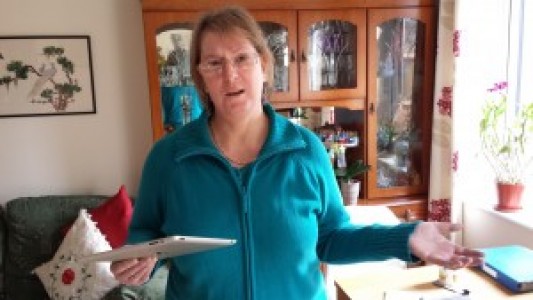
An amazing solution
That sounds pretty grim. However, would you be prepared to spend about £5 to get a dependable, easy-to-follow guide?
If so, you have come to the right place!
As part of my role as civil celebrant, I frequently come across couples swimming in a sea of bewilderment and despair. There’s not a lot of help out there for them – although there is at least the option of an event planner. Naurally, these don’t come cheaply.
What if there was a guide that they could buy for ‘peanuts’, that would lead them gently and securely towards the Eldorado of a successful wedding? Towards a unique, memorable and meaningful day? That would offer them great ideas? Something that they could consult at every step of the way?
Well, look no further.
I am proud and excited to announce that I have put the proverbial pen to paper (except it’s all been done by computer, of course) and produced a handbook specifically aimed at helping couples get on their way with a minimum of fuss or difficulty. That’s not to say that there isn’t still hard work to be done, or time and money to expend. Of course, there is, but you can at least be sure that you are progressing, covering most eventualities and not going round in circles.
What areas are covered?
Some of the areas I look at include:
- choice of ceremony and celebrant
- the service: rituals, vows, music, etc.
- ‘team’ roles
- speeches
- guests
- children
- same-sex weddings
- hiring professionals
- social media
I don’t pretend to have something for absolutely everyone (budgets, as well as taste, will vary enormously), but I am convinced that there is so much in the wedding guide for everyone (from first-timers to wedding planners!).
I am delighted to be the one to fill what seems to be a huge gap in the market.
If you know somebody who might benefit from this handbook, please put them in touch with me. It’s easy to buy: just click here, and you’ll be through to Amazon.
I am not actually anticipating a million-seller block-buster, but I am really excited to be offering practical help to couples, so that they can have the wedding they are dreaming about!






